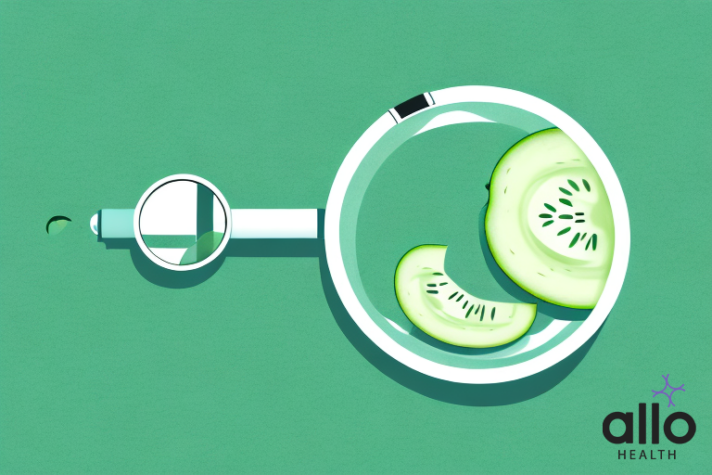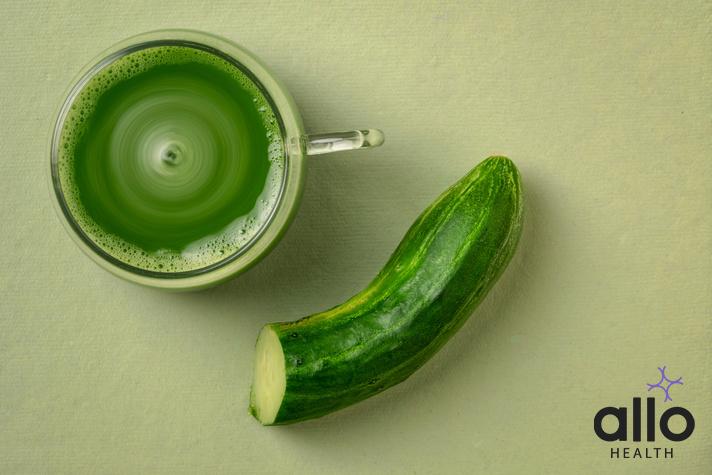Is Cucumber Good for Erectile Dysfunction?

Allo Health is dedicated to personalized well-being, offering support and trusted information tailored to individual health goals. The platform emphasizes human-generated content, led by a distinguished medical team of experts, including physicians and sexual health specialists. Their commitment to credibility involves rigorous fact-checking, authoritative research, and continuous updates to ensure accurate, up-to-date information. Allo Health's unique approach goes beyond conventional platforms, providing expert-led insights and a continuous commitment to excellence, with user feedback playing a crucial role in shaping the platform's authoritative voice.

Dr Sanina Mansoor holds MBBS degree from Yenepoya university,Mangalore.She has 8 years of experience working as a medical officer at various health centres and medical colleges.
Why This Was Upated?
Our experts continually monitor the health and wellness space, and we update our articles when new information became available.
Updated on 05 December, 2023
- Article was updated as part of our commitment to diversity, equity, and inclusion.

"The following blog article provides general information and insights on various topics. However, it is important to note that the information presented is not intended as professional advice in any specific field or area. The content of this blog is for general educational and informational purposes only.
Book consultation
The content should not be interpreted as endorsement, recommendation, or guarantee of any product, service, or information mentioned. Readers are solely responsible for the decisions and actions they take based on the information provided in this blog. It is essential to exercise individual judgment, critical thinking, and personal responsibility when applying or implementing any information or suggestions discussed in the blog."
Erectile dysfunction (ED) is a common problem among men, particularly those over the age of 40. ED is characterised by difficulty achieving or maintaining an erection during sexual activity. This can lead to feelings of embarrassment, shame, and can negatively impact overall quality of life.
While there are many treatments available for ED, some individuals prefer to explore natural remedies such as cucumbers.
In this article, we will take a closer look at the evidence surrounding cucumbers and their potential effectiveness in treating ED.
What is Erectile Dysfunction?
Erectile dysfunction (ED) is a condition characterised by the inability to achieve or maintain an erection sufficient for sexual intercourse. It can be caused by various factors, including physical and psychological concerns.
Physical causes may include:
- Cardiovascular problems
- Diabetes
- Hormonal imbalances
- Side effects of certain medications.
Psychological causes may include:
- Stress
- Anxiety
- Depression
- Relationship issues
Treatment options for erectile dysfunction range from lifestyle changes and medications to counselling, addressing underlying health issues, or considering surgical interventions, with the choice depending on the individual’s specific circumstances.
However, some people prefer to try out natural ways to address erectile concerns such as cucumbers.
Cucumber and It’s Nutritional Composition
Cucumber is a widely cultivated plant that belongs to the gourd family, Cucurbitaceae. It is typically grown for its elongated, green, cylindrical fruit with edible seeds inside. Cucumbers are often used in culinary dishes, salads, and pickling. They have a high water content, making them refreshing and hydrating.
Nutritional Composition:
| Nutrient | Amount per 100 grams |
|---|---|
| Calories | 16 |
| Water content | About 95% |
| Protein | 0.7 grams |
| Carbohydrates | 3.6 grams |
| – Dietary fiber | 0.5 grams |
| – Sugars | 1.7 grams |
| Fat | 0.2 grams |
| Vitamins and minerals | |
| – Vitamin K | 16.4 micrograms (20% DV) |
| – Vitamin C | 2.8 milligrams (4% DV) |
| – Potassium | 147 milligrams |
| – Magnesium | 13 milligrams |
| – Manganese | 0.1 milligrams |
| – Calcium | 16 milligrams |
| – Iron | 0.3 milligrams |
Is Cucumber Good For Erectile Dysfunction?
Cucumbers, while they may have some nutritional benefits, are not typically considered a direct treatment for erectile dysfunction (ED).
Potential Benefits of Cucumber for ED:
- Hydration: Cucumbers have a high water content, contributing to overall hydration, which is essential for general health, including sexual well-being. Cucumbers have natural diuretic properties, which can aid in reducing swelling and inflammation in the penis, potentially alleviating symptoms of erectile dysfunction.
- Nutrient Content: Cucumbers contain small amounts of vitamins and minerals, including vitamin K, vitamin C, potassium, and magnesium, which play various roles in supporting sexual health along with overall health.
While maintaining a healthy diet that includes cucumbers and other nutrient-rich foods is beneficial for overall well-being, the consumption of cucumbers alone is not a substitute for professional medical diagnosis and treatment of ED or any other sexual dysfunction.

If someone is experiencing concerns related to sexual health, including ED, it’s advisable to consult with a healthcare professional. ED can have various underlying causes, including psychological and medical factors, and a thorough evaluation by a qualified healthcare provider is necessary to determine an appropriate course of action.
Why Cucumber May Not Work for ED
While natural options like consuming cucumbers and adopting a healthy lifestyle have their merits for overall well-being, they may not be sufficient or ideal for addressing specific erectile concerns.
- Lack of Scientific Evidence: Natural remedies often lack robust scientific evidence supporting their efficacy in treating erectile dysfunction (ED). Evidence-based medical interventions have undergone rigorous testing to demonstrate their effectiveness.
- Complexity of ED Causes: Erectile dysfunction can result from a variety of factors, including physical, psychological, and medical issues. Natural options might not address the underlying causes of ED adequately, requiring a more comprehensive and targeted approach.
- Inconsistent Results: Natural remedies may yield inconsistent results among individuals. ED is a complex condition, and what works for one person may not be effective for another. Evidence-based treatments offer a more standardized and reliable approach.
- Risk of Delaying Effective Treatment: Relying solely on natural remedies may delay seeking professional medical help. ED can be a symptom of underlying health issues that may require medical attention. Timely diagnosis and intervention are crucial for effective management.
- Unproven Claims: Some natural remedies may be marketed with unproven claims about their effectiveness in treating ED. It’s essential to approach such claims with skepticism and prioritize treatments with a solid scientific foundation.
- Limited Regulation: Natural remedies are often less regulated than pharmaceutical interventions. This lack of regulation can lead to variations in product quality and consistency, making it challenging to ensure the reliability of the treatment.
- Need for Comprehensive Evaluation: ED may be an early indicator of other health conditions, such as cardiovascular disease or diabetes. Professional medical evaluation is crucial to identify and address these underlying issues, which natural remedies may not adequately manage.
- Individual Variability: Individuals respond differently to natural remedies. What works for one person may not work for another due to variations in health, lifestyle, and the specific causes of their ED. Evidence-based treatments offer a more tailored and individualized approach.
Why is Evidence-Based Treatment for ED Important?
There are several reasons as to why evidence-based treatment is the best road to take when it comes to treatment of erectile dysfunction:
- Accuracy and Effectiveness: Evidence-based treatments for ED are grounded in research and proven methods, ensuring accurate and effective solutions.
- Avoiding Guesswork: Relying on evidence prevents random guesses in treatment, providing a clear understanding of what works and what doesn’t.
- Safety and Well-being: Evidence-based treatments prioritize safety, offering reliable approaches that have been demonstrated to be safe and effective.
- Building Trust: These treatments have a track record of success, building trust in their reliability and effectiveness over time.
- Cost-Effectiveness: Evidence-based treatments provide the most benefits for the investment, ensuring cost-effective solutions for managing ED.
- Personalized Care: Tailored to individual needs, evidence-based treatments consider specific factors for a personalized and targeted approach.
- Continuous Improvement: These treatments evolve based on the latest research, ensuring that strategies for managing ED stay up-to-date and effective.
What are Evidence-Based Treatment Options for ED?
- Phosphodiesterase type 5 (PDE5) Inhibitors: Medications like sildenafil (Viagra), tadalafil (Cialis), and vardenafil (Levitra) are commonly prescribed. They enhance the effects of nitric oxide, a chemical that relaxes muscles in the penis, promoting blood flow.
- Vacuum Erection Devices (VED): VEDs are non-invasive devices that use a vacuum to draw blood into the penis, creating an erection. A constriction ring is then placed at the base of the penis to maintain the erection.
- Intracavernosal Injections: Medications like alprostadil can be injected directly into the penis to induce an erection. This method is often effective for those who cannot tolerate or do not respond well to oral medications.
- Intraurethral Suppositories: Alprostadil can also be administered through a suppository placed in the urethra. It helps in the same way as intracavernosal injections but is less invasive.
- Testosterone Replacement Therapy (TRT): For men with low testosterone levels, TRT can be beneficial in improving sexual function. It is typically recommended for those with documented low testosterone levels. Read about the effects of low testosterone levels here.
- Psychotherapy: Psychological factors, such as anxiety or depression, can contribute to ED. Psychotherapy, including cognitive-behavioral therapy (CBT) and counseling, may help address these psychological aspects.
- Lifestyle Changes: Modifying lifestyle factors can have a positive impact on ED. This includes maintaining a healthy diet, managing weight, regular exercise, managing stress, and avoiding tobacco and excessive alcohol consumption.
- Penile Implants: In cases where other treatments are ineffective, penile implants (prostheses) may be considered. These are surgically implanted devices that allow for an erection when desired.
- Vascular Surgery: In some cases, surgery may be recommended to improve blood flow to the penis. This option is usually considered when there are specific vascular issues contributing to ED.

How Can I Access These Treatments?
Accessing treatments for erectile dysfunction (ED) involves several steps, and it’s important to consult with a healthcare professional for personalized advice.
- Consult a Healthcare Professional: Schedule an appointment with an experienced doctor, such as a urologist or primary care physician, to discuss your concerns about ED. They will conduct a thorough evaluation, including a medical history, physical examination, and possibly lab tests.
- Discuss Treatment Options: Based on the assessment, your healthcare provider will provide you with medical advice, discuss various treatment options suitable for your specific situation. This may include lifestyle changes, medications, devices, or other interventions.
- Prescription Medications: If prescribed medications (such as phosphodiesterase type 5 inhibitors) are part of the treatment plan, your healthcare provider will provide a prescription. You can then obtain these medications from a pharmacy.
- Devices and Injections: For devices like vacuum erection devices (VED) or medications administered through injections, your healthcare provider will guide you on their usage, and they may provide training or recommend a specialist for further assistance.
- Lifestyle Changes: Implementing lifestyle changes may involve adopting a healthier diet, regular exercise, managing stress, and avoiding tobacco and excessive alcohol consumption. Your healthcare provider can offer guidance on making these changes.
- Psychotherapy or Counselling: If psychotherapy or counseling is recommended, your healthcare provider may refer you to a mental health professional who specializes in sexual health.
- Surgical Interventions: If surgical interventions like penile implants or vascular surgery are considered, your healthcare provider will discuss the potential benefits and risks. If you decide to proceed, they will refer you to a specialist for further evaluation and scheduling of the procedure.
- Follow-Up Appointments: Regular follow-up appointments with your healthcare provider are essential to monitor the effectiveness of the chosen treatment and make adjustments if needed.
Note: Seeking expert opinions from doctors will help you address concerns related to erectile function with the best treatment option tailored to your needs.
Key Takeaways
- Erectile dysfunction (ED) is common among men, impacting quality of life and causing feelings of embarrassment.
- Natural remedies like cucumbers are explored, but their efficacy lacks scientific support.
- Cucumber’s nutritional benefits, including hydration and nutrient content, are discussed.
- Evidence-based treatments for ED, including medications, devices, injections, and lifestyle changes, are highlighted.
- Reasons why natural methods like cucumber intake may not be ideal for ED include lack of evidence, variability in results, and potential delay in effective treatment.
- The importance of evidence-based treatment is emphasized, focusing on accuracy, safety, trust, cost-effectiveness, personalized care, and continuous improvement.
Frequently Asked Questions
Q: How does ED medications work?
A: Erectile dysfunction (ED) medications, such as sildenafil (Viagra), work by inhibiting phosphodiesterase type 5 (PDE5), increasing levels of nitric oxide. This relaxes the blood vessels, enhancing blood flow to the penis, facilitating and sustaining an erection during sexual arousal.
Q: Can citrulline-rich foods lead to improvement in erectile dysfunction?
A: Citrulline, found in foods like watermelon and cucumber, may boost nitric oxide production, potentially improving blood flow and aiding in erectile function. However, more research is needed to establish its efficacy as a standalone treatment for ED.
Q: What are the symptoms of erectile dysfunction?
A: Erectile dysfunction symptoms include difficulty achieving or maintaining an erection during sexual activity, reduced sexual desire, and emotional distress or embarrassment. Persistent occurrences may warrant consultation with a healthcare professional for further evaluation and guidance.
Q: Are there any lifestyle changes that can help alleviate erectile dysfunction symptoms?
A: Yes, adopting a healthier lifestyle, including regular exercise, maintaining a balanced diet, managing stress, and avoiding excessive alcohol and tobacco use, can contribute to improved overall sexual health and may help alleviate symptoms of erectile dysfunction.
Q: When should someone seek professional help for erectile dysfunction?
A: It is advisable to seek professional help for erectile dysfunction when symptoms persist for an extended period, causing distress. Additionally, individuals with underlying health conditions, such as diabetes or cardiovascular issues, should consult a healthcare professional promptly for comprehensive evaluation and guidance.






































